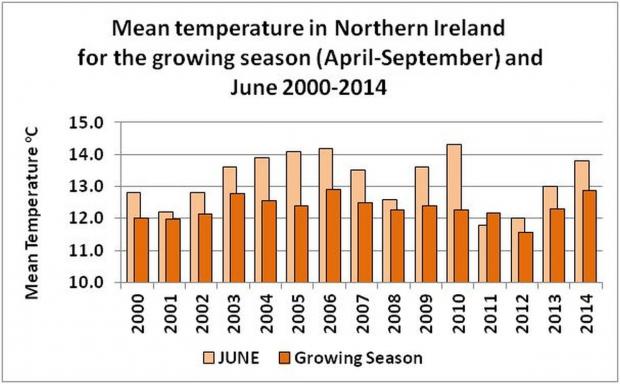“I’d rather see a bad variety like that in your trial than my field!” – this was the comment a farmer passed on to one of the scientists at the AFBI Plant Testing Station, Crossnacreevy at a maize open day.

Maize varieties
Maize varieties can show huge differences in height, bulk and in some cases, ability to remain standing until harvest. In the 2014 trials at AFBI Crossnacreevy there were two varieties where, after the strong winds on the night of Sunday 5th October, almost every plant had brackled* on each of two different sites. The two varieties had passed their National List tests in England and were undergoing tests by AFBI for suitability in Northern Ireland. Based on their performance in the AFBI trials both varieties have been excluded from the DARD Recommended List for maize varieties in Northern Ireland.
(*”brackled” is like “lodged” except where lodged is leaning from the base of the plant, brackled is broken in the middle)
Why did we sow them in the first place?
Many new varieties of maize become available each year for commercial use having passed UK National List testing. Some of these varieties will have test results for yield and dry matter which would make them suitable for growth in Northern Ireland. Maize varieties are tested initially in England and while the results also contain information on lodging, their conditions, including ability to stand in strong winds are obviously different to those in NI. AFBI further tests the most suitable new maize varieties alongside currently recommended varieties at Crossnacreevy, on behalf of DARD, so that when new varieties are recommended, farmers know that they are the best varieties for Northern Ireland conditions.
Maize Results

Dry matter yields
The DM yields of the top five yielding maize varieties sown under plastic averaged 16.5 t DM per ha at 36% DM with 6.3t starch /ha. For open- sown varieties the top five varieties averaged 13.0 t DM per ha at 29% DM with 3.7t starch per ha. These are similar to yields in 2013 and during the period 2003-2006 which generally reflected a run of warm summer temperatures when the Northern Ireland maize area was increasing annually. As can be seen from the graph, the temperatures both for June and the whole growing season in 2008, 2011 and 2012 were cooler and these years corresponded with a reduced interest in maize and, in the case of 2012, a forage crisis due to low yields across many crops.
The use of plastic on maize will not only reduce the risk of poor yield but enhances the production of starch, with the extra starch product of much more value than the extra cost of plastic. New varieties have been tested at Crossnacreevy which produce much higher starch yields and these are described in the new recommended lists.
Summary
With another growing season rapidly approaching, farmers in Northern Ireland have a wide range of varieties from differing crops to choose from. Not all varieties will perform well under Northern Ireland conditions and choosing an unsuitable variety can have a very significant adverse effect on the performance of the crop. However by choosing varieties from AFBI Recommended Lists, farmers have the assurance of knowing that the varieties listed have performed well under local conditions and poor varieties are excluded from the list.
Notes to editors:
AFBI carries out high-quality technology research and development, statutory, analytical, and diagnostic testing functions for DARD and other Government departments, public bodies and commercial companies.
AFBI's Vision is “Scientific excellence in Northern Ireland … serving the world”.
All media enquiries to AFBI Press Office
Latest news
- AFBI issues Nematodirus warning – Spring 2025 11 April 2025
- Managing Nature Based Risks to the UK Economy and Opportunities for Green Finance 08 April 2025
- AFBI Hillsborough host AERA committee 27 March 2025
- The Omics Days Conference 27 March 2025
